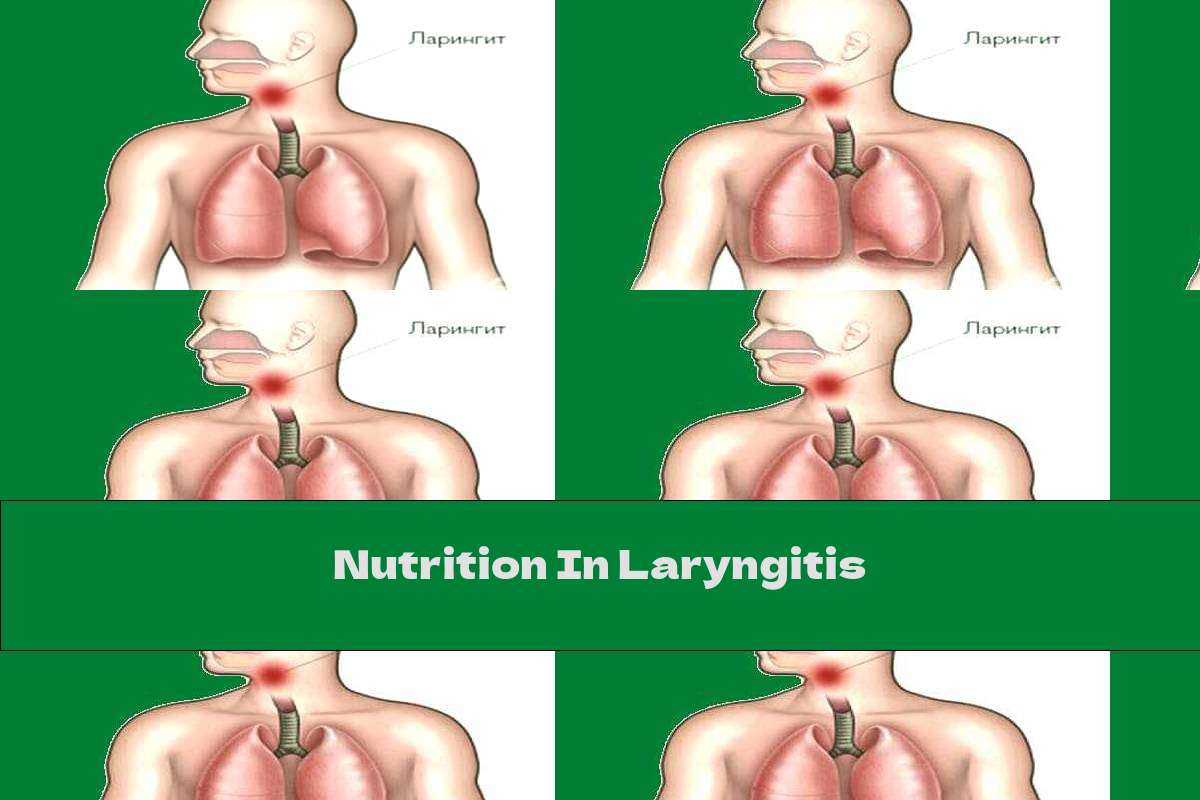Nutrition In Laryngitis
 Author: Maryam Ayres
Time for reading: ~3
minutes
Last Updated:
August 08, 2022
Author: Maryam Ayres
Time for reading: ~3
minutes
Last Updated:
August 08, 2022

CHAPTERS (Table Of Contents)
In this article, learn more about Nutrition In Laryngitis. Nutrition in laryngitis.
Translated from the ancient Greek language, the term "laryngitis" means larynx and defines the vulnerable part of the body in infection. The development of the disease begins with inflammation of the laryngeal mucosa, swelling of the vocal cords. If the beginning of the trachea is affected, then the problem is defined as laryngotracheitis.
The reasons
Most often laryngitis develops against the background of colds, as a consequence of breathing through the mouth when it is impossible or difficult to breathe through the nose.
Another factor is the damage or strong tension of the vocal cords (they are possible after shouting and a long period of speaking). The risk groups include people whose profession is directly related to active speech activity - teachers, announcers, singers, actors.
No less dangerous for the larynx are dry and particulate air, smoking, alcohol abuse, and too hot or cold foods and beverages.
The development of laryngitis contributes to the appearance of:
- allergic reactions;
- reduced immunity;
- mucosal atrophy;
- problems with the gastrointestinal tract.
Adolescents are also at risk, as the disease is often seen during puberty, when a voice mutation occurs.
The rapid development of laryngitis provokes bacterial flora in scarlet fever, whooping cough, diphtheria.
There are chronic and acute forms of the problem, which are classified according to the duration of its course, the rate of development and remission.
Useful foods for laryngitis
Successful treatment of the problem depends not only on medication, but also on following a special diet.
It should not be forgotten that the consumption of hot or cold foods and drinks is harmful. Do not use spices.
- It is recommended that the food be warm liquid or pureed to avoid mechanical trauma to the inflamed mucosa of the larynx.
- For the preparation of soups it is good to use chicken broth and vegetables to be consumed in the form of porridge / puree.
- Sour and honey tea are very useful. Excessive fluid intake significantly alleviates the course of the disease.
- Vegetable fats have a beneficial effect, "dressing" the mucosa. They can be used as drops placed in the nose or to smear the throat with them.
- As laryngitis is mainly a consequence of a cold, it is necessary to pay attention to immunity and increase the intake of vitamins, and juices and fruits (pureed) are suitable for this purpose.
- If the disease is the result of a gastrointestinal problem, it is necessary to exclude from the menu all foods that have a relaxing effect on the esophageal sphincter. Precisely due to the malfunction of the latter, the gastric juice entering the larynx injures the mucosa, causing constant inflammation.
In laryngitis due to gastroesophageal reflux disease, it is recommended to adhere to the following rules:
- eating often and in small portions;
- porridges and pasta should be boiled only in water;
- vegetables should be eaten ground or pureed;
- meat and poultry should not be greasy;
- to exclude from the menu dairy products with high acidity and sharp cheeses;
- chocolate, nuts and halva should not be taken during treatment;
- alcohol, coffee and carbonated water are prohibited;
- sour fruits and berries should not be eaten.
It is important to know that these dietary recommendations are general. Each case requires an individually prescribed diet by a doctor.
Dangerous and harmful products for laryngitis
Proper therapy means a comprehensive approach to treating the disease, so the products consumed should not be neglected.
It is absolutely forbidden:- all alcoholic beverages;
- soda;
- seeds and nuts;
- garlic, black pepper, mustard, onion, horseradish;
- any other spices.
It is good that the dishes are not fried and greasy, and that the meat and fish are steamed.
- Nutrition in laryngotracheitis
Related Articles
- The Ultimate Guide to Hickory Smoked Bacon in Nutrition and Healthy Eating
- Fruitskewers in Honey Syrup: Nutritional Benefits and Recipes
- The Ultimate Guide to Buffer 500 in Nutrition: Benefits and Usage
- Nutritional Benefits of Fruit Skewers in Honey Syrup: A Delicious and Healthy Recipe
- Nutrition Guide: Fruitskewers in Honey Syrup - Benefits, Recipes, and More